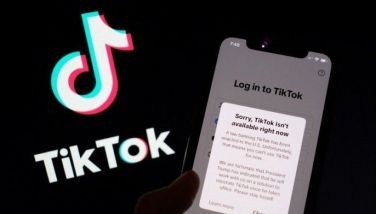Coming into new era in cognitive
MANILA, Philippines - There’s a new buzzword in Big Blue’s world: cognitive computing.
Not that the idea is something new. For many years now, IBM has been making huge strides in creating real-world applications for its cognitive computing platform, Watson.
Recent tech news, however, has made it seem like the world has woken up to a very near possibility of thinking machines, artificial intelligence (AI), robotics, and virtual reality – applications that are derivatives of a computing model that simulates the human thought process.
Facebook, for one, hogged headlines recently when its founder and CEO Mark Zuckerberg posted on the social media site that his personal challenge for 2016 is to build a simple AI to run his home and help him with his work.
“I’m going to start by exploring what technology is already out there. Then I’ll start teaching it to understand my voice to control everything in our home – music, lights, temperature and so on. I’ll teach it to let friends in by looking at their faces when they ring the doorbell. I’ll teach it to let me know if anything is going on in Max’s room that I need to check on when I’m not with her. On the work side, it’ll help me visualize data in VR to help me build better services and lead my organizations more effectively,” he says.
Futuristic? Not really. There have been many initiatives in the enterprise space that show how intelligent systems can make a huge difference, and now they are encroaching even into our homes and personal space.
Elemental Path, a startup maker of Internet-connected smart toys, for example, has tapped IBM Watson to power its flagship product, CogniToys. Basically, what the company’s smart dinosaur toys can do is answer kids’ questions – why, when, where, who, etc. – in a way that is age-appropriate. Think of it is an encyclopedia of knowledge that can even engage your kids in conversation.
“What is the speed of light,” a grade schooler may ask. And the neon green dino would answer: 186,000 miles per second. The video posted on the website also shows the dino asking a kid a simple math question and exchanging ‘Knock, knock’ jokes with another kid.
This is because the toy has “a cloud platform that integrates an educational framework that provides age-appropriate content,” as well as “hardware and software that equips toys with the ability to hold a conversation.” The bigger innovation, however, here is that the company promises that the toys could ‘learn’ and ’grow’ with the kid.
Cognitive systems are fundamentally very different, according to Luis Pineda, president and country general manager, IBM Philippines, in his talk with the IT Journalists Association of the Philippines (Cyberpress) last month.
“You know a traditional computing system, you program it, it performs specific tasks. But cognitive systems are capable of learning from their interactions with humans, their interactions with data and are built to analyze information and to draw insights from it,” he explains.
When IBM Watson defeated two world champions of the game Double Jeopardy in an exhibition match in 2011, it was viewed as a portent of things to come in the computing world. Today, that machine can analyze unstructured data like news articles, research reports, information from books, encyclopedia, social media posts and enterprise system data. It can continually question and present answers and solutions.
In many parts of the world, Watson-powered innovations are raising the bar on what machines can do. Here are some:
Healthcare
The Bumrungrad International Hospital (Thailand) is now using Watson for Oncology, developed with Memorial Sloan Kettering (MSK), to improve the quality of cancer care at its medical center in Bangkok and case evaluation at referral offices in 16 countries.
The system helps Bumrungrad doctors plan the most effective treatments for cancer patients based on each patient’s profile, medical evidence, published research, and the extensive clinical expertise of MSK. It analyzes vast quantities of information and presents a summary of findings relevant to each patient case, including treatment options based on National Comprehensive Cancer Network (NCCN) guidelines.
Retail
The North Face launched a new interactive online shopping experience powered by IBM’s Watson last month which allows customers to use natural conversation as they shop online via an intuitive, dialog-based recommendation engine powered by Fluid XPS and receive outerwear recommendations that are tailored to their needs.
Banking
In January 2014, IBM and Singapore’s DBS Bank announced a partnership to apply Watson to its wealth management business to improve service to its affluent customers.
Sports
In October, IBM partnered with Triax Technologies, Spare and 113 Industries to develop cognitive applications powered by Watson that will help athletes train better, revolutionize golf training, amplify the game-day experience for fans, and ultimately transform the future of sports.
Spare5, for example, is now creating a cognitive app called Watson Golf Pro that leverages Watson’s deep learning, natural language, and vision capabilities to act as a personal caddy that amateur players can consult while at the driving range or on the course.
Health and wellness
Nutrino, a mobile app that provides expectant mothers with real-time science-based, personalized and contextual nutrition advice, was launched in Tel Aviv last month. Nutrino’s nutrition insights platform is combined with Watson’s natural language and deep question-and-answer capabilities to offer personalized meal recommendations and 24/7 nutritional support.
At the heart of this major shift in the way computers are used to solve real-world problems is the massive amount of data that we generate. IBM figures show that by 2020, 1.7 MB of new information will be created every minute for every human being on the planet.
Healthcare data alone will grow by 99 per cent by 2017, around 88 per cent of which are unstructured. These will be coming from patient sensors, wearables, smart watches, medical records, test results and implants, among others. Media data is also expected to grow 97 per cent by 2017, with video, film, images, audio as the biggest contributors. Every month, 27.5 TB of Internet video data are generated, or the equivalent of 343 years of video in HD.
“The world is being reinvented by software code and the cloud is really the platform on which these new digital builders are creating software,” says Pineda. “More precisely, they are writing code connecting to pipelines of data out there and integrating applications by APIs. By some estimates, there will be one million APIs before the end of the decade, including cognitive APIs.”
The IBM chief also shares that out of 18.2 million software developers in the world, 1.2 million are now publishing APIs for external use and 4.7 million are limited to their partners and registered associates. By 2020, IBM estimates that 26 billion devices will be using one trillion applications.
“Because of these, the machines of the future will do much more and do much more than just compute. It will do much more to sense, learn and better predict the consequences of actions and in the years ahead these machines will cull insights from the vast amount of information out there being gathered to help us learn how the world really works and make sense of that complexity,” he concludes.
- Latest


























